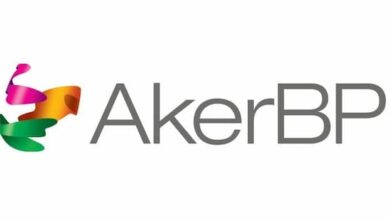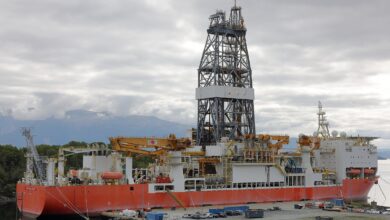Bromwich defends BSEE jurisdiction expansion at IADC Annual General Meeting
By Linda Hsieh, managing editor
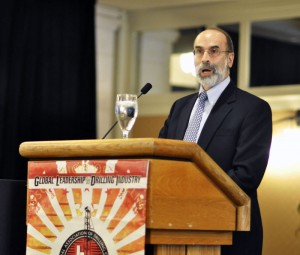
Taking the opportunity to address drilling contractors before stepping down as director of the US Bureau of Safety and Environmental Enforcement (BSEE) next month, Michael Bromwich took the podium at the 2011 IADC Annual General Meeting last week to defend the agency’s recent extension of its regulatory reach to include contractors. Industry believes the move lacks precedent and could deeply trouble the insurance market for offshore drillers.
“We didn’t take this step lightly, nor did we take it before fully satisfying ourselves that we had the legal authority to do so. But once we concluded that we did, there was no good reason not to do so,” Mr Bromwich said during the keynote address. He added that he believes BSEE will still be able to preserve the principle of holding operators fully responsible and, in most cases, solely responsible, even with the ability to pursue regulatory actions against contractors for serious violations.
“We will be careful and measured in applying our regulatory authority to contractors, but we will not hesitate when we determine it is appropriate and necessary,” he said.
Illustrating BSEE’s new approach to accountability, the agency in October initiated civil penalty proceedings against Transocean and Halliburton related to Macondo. “I know it is a new view for this industry, but I’m convinced it’s the right view,” Mr Bromwich said.
Further, he stated that BSEE is working to speed up the pace at which the agency can impose civil penalties, as well as seeking authority to increase the maximum rate for civil penalties from the current $40,000 per day per violation.
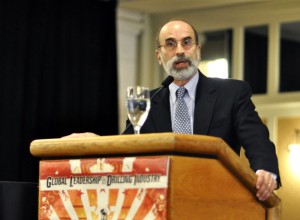
Mr Bromwich also took time to acknowledge the painful effects the 2010 drilling moratorium inflicted on the industry. “We understand that and truly regret the harm suffered by many businesses and their employees,” he said. However, the risks that the Interior Department saw at the time – deficiencies in the regulatory regime and in industry’s containment and spill response capabilities – drove what the government saw as a necessary decision.
“I understand that things may have very well looked very different from your perspective, but that’s the way things looked from ours,” he said, adding that the decisions were made in good faith and without any ulterior political motives.
“Our responsibilities quite simply were different from yours. Your duties ran to your employees and your shareholders; ours ran to the public.”
At the same time that industry has been working to improve spill and containment response over the past year and a half, regulators also have been working to improve their end of the bargain – ranging from a total agency reorganization to training for inspectors to a more streamlined and transparent permitting process.
The transformation of the Minerals Management Service (MMS) into the Bureau of Ocean Energy Management, Regulation and Enforcement (BOEMRE) last year first split off the revenue collection piece of the agency. This was followed in October 2011 by BOEMRE’s split into the current BSEE and Bureau of Ocean Energy Management (BOEM). The reorganization was undertaken to fix structural flaws in the regime that had impaired its ability to carry out core regulatory and enforcement functions, Mr Bromwich said.
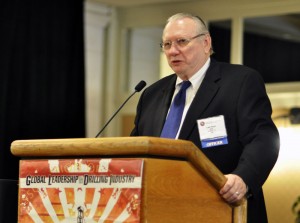
A wholesale reexamination of functions within the agency also led to an expansion of its inspectors, who are responsible for monitoring more than 3,000 facilities on the US Outer Continental Shelf. The fact that the MMS had fewer than 60 inspectors and no training program for them “was the product of historical failures of leadership as well as a shortage of budgetary resources,” he said. These issues have been addressed through the creation of a national offshore training and learning center and the hiring of the agency’s first training director.
The agency also has hired 37 new inspectors since July 2010, with nine more expected to join BSEE by January 2012. This will be a nearly 80% increase in the agency’s inspector workforce over 18 months, Mr Bromwich said.
Further, an environmental enforcement division has been established to provide regulatory oversight focused on compliance by operators with existing environmental regulations.
On permitting as well, Mr Bromwich believes the agency has made “enormous strides in recent months to review and approve permits and to increase the transparency of our process.”
According to Mr Bromwich, to date 91 new shallow-water well permits have been issued since new safety and environmental standards were implemented in June 2010. Sixteen of those permits are still pending, he said, with eight returned to the operator for more information. For deepwater permits requiring subsea containment, 182 permits for 55 unique wells have been approved since the first successful demonstration of subsea containment capabilities in February 2011. A total 27 of those permits are pending, and 14 were returned with requests for additional information.
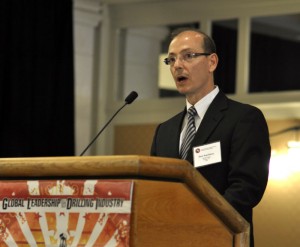
For deepwater wells not requiring subsea containment, 48 have been approved since June 2010; two are pending and two were returned to the operator for more information.
“I’m well aware that these numbers are not as high as you would like them to be and not as high as they were before Deepwater Horizon, but the world has changed irrevocably since then,” Mr Bromwich said. “I know of no one who denies that things are now improving.”
To streamline the permitting process, an application completeness checklist was issued so operators know exactly what is required. A further step has been taken to allow authorized users of BSEE’s online system to track the status of their permit applications.
“For us, Deepwater Horizon was a seminal event in the history of offshore drilling that will and should have a lasting impact on the way we do business. It has driven much of what we have done over the past 16 months and much of the agenda we will be pursuing as we move forward,” he said.
Mr Bromwich is scheduled to hand over the reins as BSEE director to Rear Admiral James Watson on 1 December.
To view Director Bromwich’s complete speech, click here.

